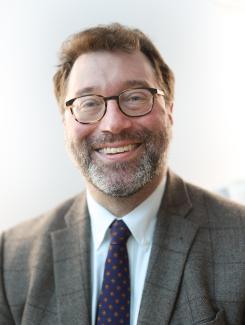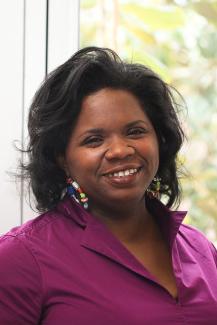University of Kentucky to Establish First of Its Kind Monument Workshop
Two longtime faculty of the University of Kentucky J. David Rosenberg College of Law recently received
a $2 million grant from the Mellon Foundation to establish the
Monument Workshop. With this grant, the Monument Workshop will provide interdisciplinary experts, outside artists, and local community leaders with the support and legal assistance necessary to create more complete stories of what the Commonwealth has been and what it can be in the future.
The Monument Workshop is the product of years of collaboration between Melynda Price and Zachary Bray, who will serve as the Workshop's co-directors. Price is the new director of the University of Michigan's Institute for Research on Women and Gender. For many years before taking on this new challenge at Michigan, Price was the director of the Gaines Center for the Humanities and the inaugural J. David Rosenberg Professor of Law at the University of Kentucky. Bray is the Ashland-Spears Distinguished Research Professor of Law at the Rosenberg College of Law. Together they have written and spoken widely about issues related to monuments and the laws that protect them.
In recent years, Price and Bray have fielded many questions from community leaders across Kentucky who want to re-imagine the monumental landscapes around them. But their experience in talking to communities across Kentucky and beyond has not always been reflected by larger conversations about monuments in America.
"The Monument Workshop at UK is the first of its kind, and we hope it can play an important role in helping to resolve current monument conflicts and in helping communities make better decisions about memorials in the future," Price said.
Whether they are statues on a courthouse square, natural places of particular beauty or historical significance, or some mixture of built and natural environments, monuments help communities share and give voice to their collective history. But for a number of reasons — some related to the legal complexity associated with revising or creating new monumental spaces — many communities' most important and compelling stories have not been publicly commemorated.
As the quintessential border state, Kentucky rests at the center of so many American stories: forever a part of both east and west, north and south. This means that the Commonwealth's communities are particularly rich in potential monumental landscapes: some reflecting community narratives that have been told for a long time, and some that badly need to be told anew.
Kentucky's unique historical importance means that the Commonwealth's monumental history has outsize importance for the rest of the country. The stories Kentuckians tell each other in their homes help shape the stories Americans everywhere tell about themselves. But for many Kentucky communities, legal complexity and related costs have been a great obstacle to revising or creating new monumental spaces that would honor neglected but critically important stories.
To date, as Price explains, "the battle over which narrative of America will prevail has largely taken place in the public debate over monuments and memorial spaces." But of course public debates are not the only way, or even the primary way, in which local leaders make decisions about the stories that their communities should tell. Accordingly, Price and Bray have designed the Monument Workshop to bring together wide-ranging experts at UK and beyond to help local communities shape their monumental landscapes in a collaborative way, reflecting the way most communities and their leaders make most of their decisions.
"We see the Workshop as the perfect opportunity to advance our own research, the research of many others in a variety of disciplines across the university—and, more importantly, to help Kentucky communities build the kinds of monumental landscapes they want and deserve," Bray added. "We are so grateful to our partners at the Mellon Foundation for helping us realize UK's mission in this way."
The Monument Workshop's grant is part of the Monuments Project, the largest initiative in the Mellon Foundation's history, which involves a multi-year commitment to transform America's commemorative landscape by supporting public projects that help represent the complexity of American stories.
The Mellon Foundation's grant to the Monument Workshop will fund a number of rotating scholars from a variety of disciplines connected to monumental history and monumental design, as well as the work of outside artists who can help communities achieve their own visions for re-imagining monumental spaces. The support from the Mellon Foundation will also fund the work of a full-time lawyer connected to the Workshop, who will be tasked with helping local governments and community groups overcome the obstacles associated with revising existing monumental sites and creating new monumental spaces. "We believe that the best way to promote an honest telling and understanding of our current monumental landscape, and how it might be more democratic and inclusive, is through the interdisciplinary might of the university alongside community stakeholders, as well as lawyers who understand the complexities of monumental law," Price explained.
In addition, the Mellon Foundation's support for the Monument Workshop will also fund the work of interested law students and other graduate students from across the university. "Since we first started thinking about this project, we have always wanted to build this Workshop so that we can train the next generation of leaders who will help communities in Kentucky and elsewhere build the monumental spaces they want in the future," Bray said. "Thanks to Mellon, the Workshop can give many of UK's best students the opportunity to get this hands-on training for the future while providing local communities with the help they need today."
"Working with Melynda on a number of projects over the years has been the joy of my professional life," Bray said. "She is an amazing scholar and teacher, a terrific collaborative partner, and she has transformed the careers of so many people here at UK. But working with our friends and partners at the Mellon Foundation to develop this grant project has also been an incredible, career-changing experience. Beyond their generous financial support, their experience and insights from dozens of other projects across the country already have had an enormous impact on how we will build this Workshop together."
"In addition to the Mellon Foundation, we are so grateful to UK Rosenberg Law Dean Davis, to our colleagues at the Rosenberg College of Law, and to the dozens of people across campus who helped us develop the application for this grant," Price said.
"The Monument Workshop will provide a fantastic opportunity for students from the UK J. David Rosenberg College of Law, scholars from across the university, and artists and community leaders to work together to help communities in Kentucky and beyond," UK Rosenberg Law Dean Mary Davis said.
"Melynda and I are very lucky to have this opportunity—as are our students and the scholars, artists, and community leaders whose work this grant's support will advance. We are so thankful for the help we have received in applying for this grant from UK's Offices of Philanthropy and Sponsored Projects Administration, Dean Davis and the UK Rosenberg College of Law, and the Mellon Foundation, who worked with us for many months to refine our ideas and develop this initiative," Bray said. More information about the Monument Workshop will soon be available at monumentworkshop.uky.edu.
The Andrew W. Mellon Foundation is the nation's largest supporter of the arts and humanities. Since 1969, the Foundation has been guided by its core belief that the humanities and arts are essential to human understanding. The Foundation believes that the arts and humanities are where we express our complex humanity and that everyone deserves the beauty, transcendence, and freedom that can be found there. Through its grants, the Mellon Foundation seeks to build just communities enriched by meaning and empowered by critical thinking, where ideas and imagination can thrive. Learn more at mellon.org.


